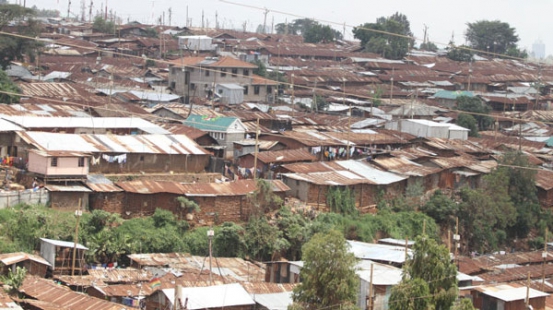
Slum dwellers in Nairobi have been forced to use buckets as substitute for toilets, particularly at night as latrine shortage continues to bite.
Janet Akoth, a resident of Kibera knows all too well what it is to share a humble abode with a bucket full of human waste throughout the night.
“The conditions forces us to use containers at night. Some people use polythene bags. It’s a common thing here as we don’t have an option,” Akoth told The Nairobian adding that, “The houses are cheap, but insecurity at night forces us to use such crude methods to help ourselves.”
Mary Wangui, 29, has seen the worst of slum life. She has two children with whom she shares a single tin-roofed room. It is her bedroom, kitchen, bedroom and toilet.
“We are praying to God to keep us from contracting water-borne diseases. The area is overcrowded, and the houses are in a pathetic state. We don’t have enough latrines here,” says Wangui who lives in Amboseli ghetto.
Wangui says she is sometimes forced to relieve herself in trenches when she is hard-pressed. But this is only possible when her neighbours are asleep, otherwise she could land in trouble.
She reveals that a single room made of iron sheets goes for between Sh4,000 and Sh5000 per month. But the house does not come with a toilet and you have to sort yourself out when nature calls.
Those who cannot the iron sheet houses go for even cheaper dwellings which are poorly constructed and go for between Sh2,000 and Sh3,000 per month. Most of these are found next to the sewerage.
“Things get so bad when it rains. The whole house floods with sewage discharged from the trenches. It’s that bad. We appeal to the government to improve on sewerage and housing conditions in Nairobi slums and make the houses affordable for casual labourers like us,” she pleaded.
The Ministry of Health’s Director of Public Health, Dr Kepher Ombacho, however says it’s the responsibility of landlords to provide conducive environment for their tenants and has asked the tenants to demand as much.
“The poor state of slums in this country is well-documented. We have drafted a policy that will be adopted by all counties on health and sanitation. This will improve the condition of slum dwellers and ensure clean and safe environment for residents across the country,” Dr Ombacho promised.
According to Dr Ombacho, the tenants should hold their landlords accountable if they fail to provide a conducive environment for them. He said they should single them out for action to be taken by the relevant authorities.
He however regretted that the management of solid waste has been a nightmare in Nairobi County, promising that they intend to prioritise the provision of clean water to each household in the slums.
 The Standard Group Plc is a multi-media organization with investments in media
platforms spanning newspaper print
operations, television, radio broadcasting, digital and online services. The
Standard Group is recognized as a
leading multi-media house in Kenya with a key influence in matters of national and
international interest.
The Standard Group Plc is a multi-media organization with investments in media
platforms spanning newspaper print
operations, television, radio broadcasting, digital and online services. The
Standard Group is recognized as a
leading multi-media house in Kenya with a key influence in matters of national and
international interest.
